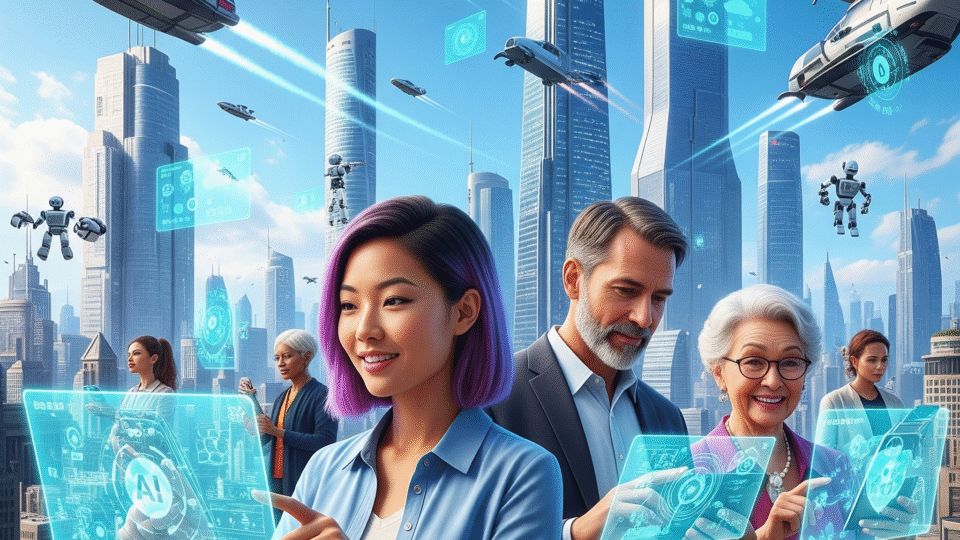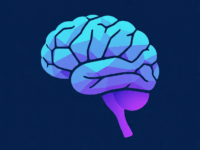
The Future of AI: What’s Coming in 2025 and Beyond
Artificial Intelligence (AI) is no longer a futuristic concept; it’s a rapidly evolving force shaping our present and accelerating towards an incredible future. From powering our everyday smart devices to revolutionizing complex industries, AI’s impact is undeniable. As we step further into 2025 and peer into the horizon beyond, the advancements in AI promise to be nothing short of transformative.
This article delves into the exciting landscape of AI in 2025 and beyond, exploring the key trends, potential benefits, and the challenges we must navigate to ensure a responsible and beneficial future for all.
Background and Context: AI’s Journey So Far
For decades, AI was largely confined to academic research and science fiction. Early forms of AI, often rule-based systems, laid the groundwork. However, the true explosion of AI capabilities began with breakthroughs in machine learning (ML) and deep learning (DL), fueled by vast amounts of data and increasing computational power.
The last few years have seen remarkable progress:
- Generative AI: Models like GPT-4, Midjourney, and DALL-E have democratized content creation, from text and images to code and even music.
- Natural Language Processing (NLP): AI systems can now understand, interpret, and generate human language with unprecedented accuracy, leading to more natural human-computer interactions.
- Computer Vision: AI’s ability to “see” and interpret visual information has advanced significantly, driving applications in autonomous vehicles, medical imaging, and surveillance.
- Automation: AI-powered automation is streamlining processes across industries, from manufacturing to customer service.
These advancements have set the stage for an even more integrated and intelligent future.
Key Areas of AI Evolution: 2025 and Beyond
The next few years will witness AI becoming even more embedded in our lives and industries. Here’s a look at some key areas of evolution:
1. Hyper-Personalization and Adaptive AI
Imagine an AI that not only understands your preferences but anticipates your needs. In 2025 and beyond, AI will move beyond basic recommendations to provide hyper-personalized experiences across various domains:
- Healthcare: AI will deliver tailored treatment plans based on individual genomic data, lifestyle, and real-time health metrics. Predictive analytics will enable proactive disease prevention.
- Education: Personalized learning platforms will adapt curricula to individual student paces and styles, identifying strengths and weaknesses to optimize learning outcomes. AI tutors will offer customized feedback and support.
- Retail and Entertainment: Expect truly bespoke shopping experiences and entertainment recommendations that evolve with your mood and preferences, delivered through intelligent interfaces.
2. Autonomous Systems and Robotics
While self-driving cars have been a prominent example, the scope of autonomous systems will expand dramatically.
- Advanced Robotics: Robots will become more dexterous, adaptable, and capable of complex decision-making in manufacturing, logistics, and even domestic environments.
- Drone Technology: AI-powered drones will be widely used for deliveries, infrastructure inspection, agriculture, and disaster response, navigating complex environments with increasing autonomy.
- Smart Cities: AI will optimize urban infrastructure, managing traffic flow, energy consumption, and public safety more efficiently.
3. The Rise of “Agentic AI”
Currently, many AI models respond to direct prompts. The next frontier is “agentic AI” – systems that can set their own goals, plan actions, and execute tasks independently, often by interacting with other AIs or digital systems.
This means AIs that can:
- Manage complex projects from start to finish.
- Conduct research and synthesize information from multiple sources.
- Automate entire workflows without constant human oversight.
4. Ethical AI and Regulation
As AI becomes more powerful, concerns around ethics, bias, privacy, and accountability are intensifying. In 2025, expect significant progress in developing robust ethical AI frameworks and regulations.
- Bias Mitigation: Advanced techniques and diverse datasets will be crucial to reduce algorithmic bias in areas like hiring, lending, and criminal justice.
- Transparency and Explainability (XAI): There will be a greater push for AI models that can explain their decisions, fostering trust and enabling better auditing.
- Global Regulations: International efforts like the EU’s AI Act will set precedents, pushing for responsible AI development and deployment worldwide.
Detailed Comparison: AI in 2020 vs. AI in 2025
To appreciate the rapid evolution, let’s look at a simplified comparison:
| Feature/Area | AI in 2020 (Approx.) | AI in 2025 (Projected) |
| Generative AI | Niche, experimental models. Basic text/image generation. | Widespread, highly sophisticated models. Multimodal, realistic content creation. |
| NLP Capability | Good for basic understanding, chatbots. | Near-human comprehension, context-aware, highly conversational. |
| Autonomy | Limited to controlled environments (e.g., factory lines). | Increased autonomy in real-world, dynamic environments. |
| Personalization | Basic recommendations based on past behavior. | Hyper-personalized, predictive, and adaptive experiences. |
| Ethical Focus | Emerging discussions, academic focus. | Central to development, robust regulatory frameworks, practical mitigation tools. |
| Industry Impact | Primarily optimizing existing processes. | Reshaping industries, creating new job categories and business models. |
Key Benefits of AI in 2025 and Beyond
The widespread adoption of AI in 2025 and beyond promises numerous benefits:
- Increased Productivity and Efficiency: Automation of mundane and repetitive tasks frees human workers to focus on creativity, problem-solving, and strategic initiatives. PwC’s 2025 Global AI Jobs Barometer indicates a fourfold increase in productivity growth in AI-exposed industries.
- Enhanced Decision-Making: AI’s ability to analyze vast datasets provides deeper insights, enabling more informed and faster decision-making across all sectors, from business to scientific research.
- New Discoveries and Innovations: AI accelerates scientific discovery, drug development, and material science by rapidly processing complex data and simulating scenarios.
- Improved Quality of Life: From personalized healthcare to smarter homes and more efficient transportation, AI can significantly enhance daily life.
- Addressing Global Challenges: AI can play a crucial role in tackling climate change, optimizing resource allocation, and improving disaster response.
Pros and Cons of AI in 2025 and Beyond
Like any powerful technology, AI presents both immense opportunities and significant challenges.
Pros:
- Economic Growth: AI drives innovation, creates new industries, and boosts productivity, leading to economic expansion.
- Job Augmentation: Rather than solely replacing jobs, AI will increasingly augment human capabilities, creating new roles and increasing the value of human skills.
- Accessibility: AI tools can enhance accessibility for individuals with disabilities, offering improved interfaces and assistive technologies.
- Safety: In dangerous environments, AI-powered robots can perform tasks that are too risky for humans.
Cons:
- Job Displacement and Reskilling: While new jobs emerge, some existing roles will be automated, necessitating widespread reskilling and upskilling initiatives.
- Ethical Dilemmas: Concerns around algorithmic bias, privacy violations, surveillance, and autonomous decision-making require careful ethical consideration and regulation.
- Security Risks: AI can be weaponized by malicious actors, leading to sophisticated cyber threats like deepfakes and AI-powered malware.
- Dependence and Over-reliance: Excessive reliance on AI could lead to a decline in certain human skills and critical thinking if not balanced with human oversight.
- Inequality: Unequal access to AI technologies and education could exacerbate existing societal inequalities.
Use Cases / Who Should Use It
The applications of AI in 2025 and beyond are incredibly diverse, touching almost every sector:
- Businesses of all sizes: For automating tasks, gaining customer insights, optimizing supply chains, and driving innovation.
- Healthcare providers: For diagnostics, personalized treatment, drug discovery, and administrative efficiency.
- Educators and Students: For personalized learning, automated grading, and access to vast knowledge bases.
- Government agencies: For public safety, urban planning, resource management, and improving citizen services.
- Artists and Creators: For generating new ideas, automating tedious parts of the creative process, and exploring new artistic mediums.
- Financial institutions: For fraud detection, algorithmic trading, and personalized financial advice.
- Manufacturers: For predictive maintenance, quality control, and optimizing production lines.
- Individual consumers: Through smart assistants, personalized recommendations, and advanced applications in daily life.
FAQs about AI in 2025 and Beyond
Here are some common questions about the future of AI:
Q1: Will AI take all our jobs by 2025?
While AI will undoubtedly automate many tasks, complete job displacement across the board by 2025 is unlikely. Instead, AI will transform existing roles and create new ones, requiring a shift in skill sets. Many studies, including PwC’s, suggest AI will lead to increased productivity and even wage premiums for AI-skilled workers.
Q2: How will AI impact privacy in 2025?
AI’s reliance on data raises significant privacy concerns. In 2025, expect increased focus on privacy-preserving AI techniques (like federated learning and differential privacy) and stronger data protection regulations to safeguard personal information.
Q3: Can AI be creative in 2025?
Absolutely! Generative AI models are already demonstrating remarkable creative capabilities in producing art, music, writing, and design. In 2025 and beyond, AI will serve as a powerful creative partner, augmenting human artistic expression rather than replacing it.
Q4: What are the biggest ethical challenges for AI in 2025?
The key ethical challenges in 2025 and beyond include algorithmic bias (ensuring fairness), transparency (understanding how AI makes decisions), accountability (determining who is responsible when AI makes errors), and the societal impact of autonomous systems.
Q5: How is AI being regulated globally in 2025?
Governments worldwide are actively working on AI regulations. In 2025, we see more comprehensive frameworks emerging, such as the EU’s AI Act, which aims to categorize AI systems by risk level and impose stricter rules on high-risk applications. Many other countries and states are also introducing AI-related legislation.
Q6: Will AI become sentient or conscious in 2025?
The development of true artificial general intelligence (AGI) and consciousness in AI is still a distant prospect, certainly beyond 2025. Current AI focuses on performing specific tasks and demonstrating intelligence within defined domains, not on possessing human-like consciousness.
Conclusion: Navigating the AI Frontier
The trajectory of AI in 2025 and beyond points towards a future deeply intertwined with intelligent systems. We are moving from AI as a novel technology to AI as an indispensable utility, seamlessly integrated into our personal and professional lives. This era promises unprecedented opportunities for innovation, efficiency, and addressing complex global challenges.
However, this transformative journey demands careful navigation. The ethical implications, potential for job market shifts, and the need for robust regulatory frameworks are critical considerations. Success will depend on our collective ability to develop and deploy AI responsibly, ensuring it serves humanity’s best interests.
Final Verdict: Embrace and Adapt
The future of AI is not about choosing whether to adopt it, but how to effectively embrace and adapt to its rapid evolution. For individuals, this means prioritizing continuous learning and developing skills that complement AI, such as creativity, critical thinking, and emotional intelligence. For businesses, it means strategic investment in AI technologies, fostering an AI-literate workforce, and embedding ethical considerations into their AI development pipelines. Governments must collaborate internationally to establish sensible regulations that encourage innovation while safeguarding societal well-being.
The journey into the future of AI is a shared one, and by working together, we can unlock its full potential to create a smarter, more productive, and more prosperous world.



















Leave a Reply